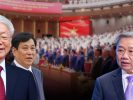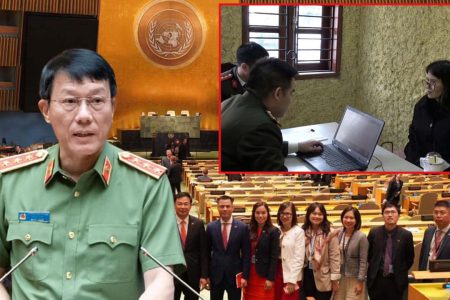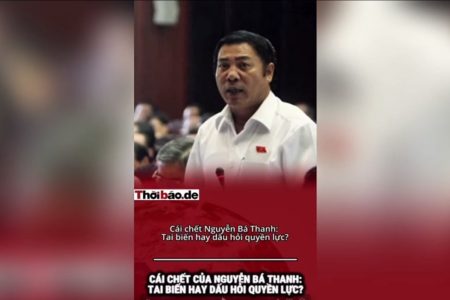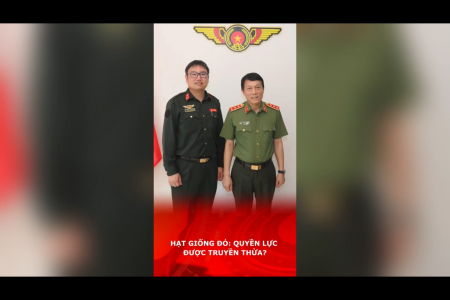
In the years before and after the 1979 Border War, Beijing used money and weapons to incite a number of ethnic minorities living along the border between the two countries, creating instability for the Vietnamese government in the northern border provinces. This problem only really ends after Vietnam and China normalized their relationship.
On November 13, the People’s Police newspaper reported, „Effectively fighting against the establishment of a ‘Hmong State’ in Son La province.“ This is an unusual behavior, especially at the present time, when Vietnam-China relations are said to be deteriorating rapidly.
Police Newspaper said that in Son La province, there are currently more than 100 people believed to be involved in propaganda activities to establish a „Hmong State.“ At the same time, according to Cong An newspaper, Son La Provincial Police have fundamentally struggled to dismantle these activities.
The story of „Hmong State“ is essentially just a fabrication to accuse the demands for religious freedom of the Hmong ethnic people living in Vietnamese territory. The H’mong people that Thoibao.de had the opportunity to contact, all affirmed that this is completely untrue.
In 2019, H’mong people in Muong Nhe district, Dien Bien province, organized a protest demanding a Protestant church for the H’Mong people. The H’mong also demanded that they have their own writing and that the Bible be translated into H’mong for them.
But the Vietnamese authorities at that time slandered them, saying that the Hmong people wanted to establish an „Autonomous Mongol Kingdom“ and used that as an excuse to severely suppress them.
According to international media reports, this incident killed 28 people, including 3 children, 130 people were arrested, and hundreds of others had to flee into the forest.
Also in this case, state media on March 19, 2020 said, „The People’s Court of Dien Bien province on March 18, 2020 sentenced two H’mong people to life imprisonment, on charges of activities aimed at overthrowing the people’s government.“
The two people convicted were Sung A Sinh (born in 1982) and Lau A Lenh (born in 1970). Both are accused of being the masterminds and playing a leading role in luring others to join the organization to establish a „Hong Kong state“ in Muong Nhe district, from August 2018 to March 2019.
According to the indictment, Lau A Lenh participated in organizing the establishment of a „Hmong state“ and propagating against the State of the Socialist Republic of Vietnam since 2010. After the riot in Muong Nhe in 2011, A Lenh was accused but escaped.
The indictment also accuses Lau A Lenh of campaigning for the establishment of a „Hmong state“ with the aim of stealing land and power in Muong Nhe district, replacing the current government with a separate government of the Mong people, have their own organizational apparatus, police, army, writing…
In addition, the Court also sentenced 12 other H’mong people to 24 months to 20 years in prison for concealing crimes and activities aimed at overthrowing the people’s government.
According to RFA, some H’mong people later fled to Thailand to seek political asylum. They said they only asked for a separate Protestant church for the H’mong people. Mr. Cu A Pao told RFA that he was arrested and accused of wanting to be Minister of Health of the „H’Mong Kingdom.“ At the same time, he also said that during his arrest, Dien Bien Provincial Police tortured and brutally beat him.
Despite the government’s repression of the H’mong people and Protestantism, protests demanding religious freedom of the H’Mong people have continued continuously since 1999 until now.
As a reminder, around the end of April and early May 2011, thousands of H’mong people in Dien Bien province participated in a protest, considered the largest ever. The local government had to mobilize a large force of police and army to brutally suppress them before they could disperse them.
According to international observers, in recent years, the Vietnamese government has had to deal with gatherings and protests by the H’mong people several times, many of which led to clashes and bloodshed.
According to experts, in the relationship between Vietnam and China, the fact that Vietnam has a border of about 1,500 km with China is an extremely complicated and sensitive issue. If the Vietnamese government cannot create consensus with ethnic minorities settling along the border between the two countries, it will be difficult for Hanoi to avoid the problem of bandit activities. In the period 1976-1987, under leadership of Secretary Le Duan, when Hanoi came out against Beijing, China used this card to make Vietnam hesitate about border security.
Thoibao.de (Translated)


























